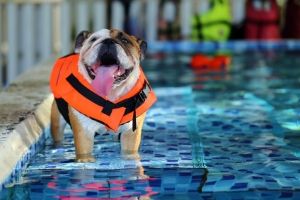As many of us remain quarantined due to COVID-19 and summer quickly approaches, those with swimming pools are likely getting prepared for The Big Open. And as temperatures outside continue to rise (well, for some of us!), dogs may look for ways to cool off when they go outside. Even when it's not very hot out, adventurous dogs may find any body of water irresistible. If you have a swimming pool - or even if you take your dog to visit a home that does - please be aware of the potential for dogs to jump or fall into a pool but not be able to get back out.
Much as with kids, it can take only a few moments for pets to drown, especially in the case of particular breeds and pets with certain conditions. Even excellent swimmers may not know how to get out of a pool and will swim until exhausted and drown.
What Can I Do to Ensure the Safety of My Pets Around Water?
Never assume that your dogs' familiarity with the pool area will keep them safe. Accidents can happen, especially at night when vision is diminished, or with advanced age.

What Dogs Are Most at Risk Around Water?
Dogs with medical conditions such as arthritis, dementia, seizures, and vision loss are at a higher risk when around pools and other bodies of water. These factors can not only increase the likelihood of accidental falls, but they also make it more difficult for pets to swim to safety. Even well-trained dogs may succumb to disorientation and panic after an unexpected slip into the water. If you're standing right there, it can be a funny moment as you help your pet to safety. But the situation would be anything but comical if your pet were to get outside and no one knew.
How Can I Make My Pool Safe For Pets?
The first and the best protection is to never leave your pet unattended when around a pool (or any body of water). If you have protective "baby" fencing around your pool, that's great. Make sure your dogs can't get over, under, or through the fence. It's easy to forget to close the gate after time in the pool. Consider putting up a sign to remind those coming in and out to close the gate behind them. Also, remember to check the fence often for openings or needed repairs.
If you have a sensor alarm (floating, mounted, or wearable) that detects water or motion in or around the pool, remember to keep it powered and maintained...and within earshot!
How Can I Help My Dog Prepare For a Water Emergency?
If you don't have a fence around your pool or a sensor alarm, you can still protect your dogs by teaching them how to swim. A dog trainer can do so if needed. When your dogs are still young, let them get familiar with the water. That doesn't mean you toss them in and assume they can swim! Even if pets are innately strong swimmers, they may not be equipped to pull themselves over the side of a swimming pool. So besides teaching your dogs to swim, you should also teach them to swim to the steps of the pool where they can get out on their own if needed. Of course, dog treats will be your best friend in this process.
Some breeds, like the bulldog, may find it a challenge to swim. In cases when you plan on being at the pool with a non-swimmer, a dog life vest can do much to keep your pups above water long enough for you to fetch them if they go in or go too far. And, again, just as with kids—don't rely on the life vest; supervision is still required.

What Other Equipment Can Help Me Keep My Dog Safe Around Water?
What if your pool doesn't have steps but has a ladder instead? You can invest in a pet-safe pool ladder or ramp to help your pets climb out of the pool. But check product reviews before you buy. If you buy and install one, make sure your dogs can use it with proper training. Even the best equipment is not guaranteed to work for your dogs.
Be particularly wary with pool covers and blankets, as dogs may perceive them as solid surfaces. If they venture onto a blanket or unsecured cover, it may give way under their weight, wrap around their bodies, and pull them underwater. When you know your pets will be in the pool area, remember to remove the blanket and maintain supervision, or secure the cover to the proper degree to prevent them from falling in.
Hypervigilance is the key to ensuring the safety of others, whether children or pets. With these tips and reminders, we hope you and your family members enjoy any time spent in the water this summer...and stay cool! If you have any health concerns about your pet that you think may affect their ability to stay safe around water, please don't hesitate to give us a call.

